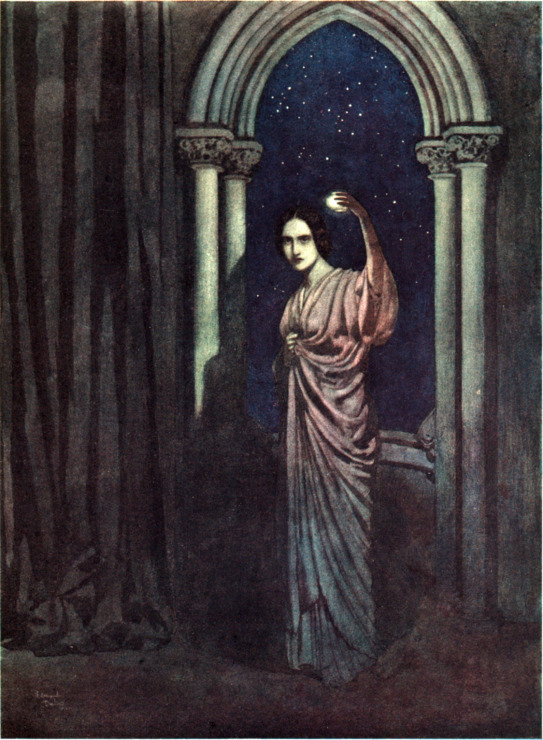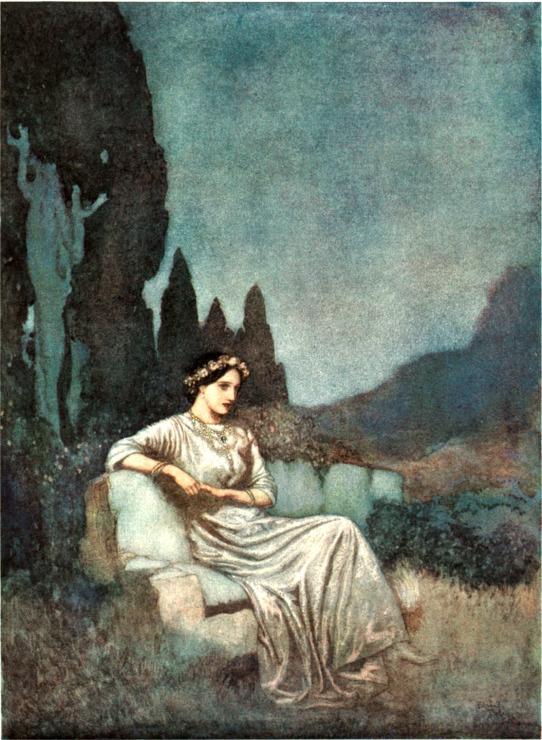< Return to Edgar Allan Poe Poems
To Helen
I saw thee once—once only—years ago:
I must not say how many—but not many.
It was a July midnight; and from out
A full-orbed moon, that, like thine own soul, soaring,
Sought a precipitate pathway up through heaven,
There fell a silvery-silken veil of light,
With quietude, and sultriness and slumber,
Upon the upturn’d faces of a thousand
Roses that grew in an enchanted garden,
Where no wind dared to stir, unless on tiptoe—
Fell on the upturn’d faces of these roses
That gave out, in return for the love-light,
Their odorous souls in an ecstatic death—
Fell on the upturn’d faces of these roses
That smiled and died in this parterre, enchanted
By thee, and by the poetry of thy presence.
Clad all in white, upon a violet bank
I saw thee half-reclining; while the moon
Fell on the upturn’d faces of the roses,
And on thine own, upturn’d—alas, in sorrow!
Was it not Fate, that, on this July midnight—
Was it not Fate (whose name is also Sorrow),
That bade me pause before that garden-gate,
To breathe the incense of those slumbering roses?
No footstep stirred: the hated world all slept,
Save only thee and me—(O Heaven!—O God!
How my heart beats in coupling those two words!)—
Save only thee and me. I paused—I looked—
And in an instant all things disappeared.
(Ah, bear in mind this garden was enchanted!)
The pearly lustre of the moon went out:
The mossy banks and the meandering paths,
The happy flowers and the repining trees,
Were seen no more: the very roses’ odors
Died in the arms of the adoring airs.
All—all expired save thee—save less than thou:
Save only the divine light in thine eyes—
Save but the soul in thine uplifted eyes.
I saw but them—they were the world to me.
I saw but them—saw only them for hours—
Saw only them until the moon went down.
What wild heart-histories seemed to lie unwritten
Upon those crystalline, celestial spheres!
How dark a woe! yet how sublime a hope!
How silently serene a sea of pride!
How daring an ambition! yet how deep—
How fathomless a capacity for love!
But now, at length, dear Dian sank from sight,
Into a western couch of thunder-cloud;
And thou, a ghost, amid the entombing trees
Didst glide away. Only thine eyes remained.
They would not go—they never yet have gone.
Lighting my lonely pathway home that night,
They have not left me (as my hopes have) since.
They follow me—they lead me through the years.
They are my ministers—yet I their slave.
Their office is to illumine and enkindle—
My duty, to be saved by their bright light,
And purified in their electric fire,
And sanctified in their elysian fire.
They fill my soul with Beauty (which is Hope),
And are far up in Heaven—the stars I kneel to
In the sad, silent watches of my night;
While even in the meridian glare of day
I see them still—two sweetly scintillant
Venuses, unextinguished by the sun!
—Edgar Allan Poe
Enjoy Artistic Interpretations of “To Helen”
“To Helen” by Edmund Dulac, 1912.
Another rendition of “To Helen” by Edmund Dulac, 1912.
About Edgar Allan Poe
Edgar Allan Poe (1809-1849) published his first collection of poems, Tamarlane, and Other Poems, in 1827, when he was 18 years old. A tendency to run up debts (including for gambling) kept him in constant state of reinvention – college student, poet, short story writer, soldier/officer school, literary journal editor and critic.
The Poe who arises from Symons’ hand (his biographer in The Telltale Heart: The Life and Works of Edgar Allan Poe) is a man who first and foremost was determined to put Southern letters on the map, aiming to wrest control from the literary establishment in New York and New England (Poe aimed some rather pointed arrows at writers like Henry Wadsworth Longfellow). For his own writing, he wanted to be considered a poet. The poems were the important works; the stories were almost after-thoughts, almost dashed off primarily to raise funds. And he always needed money.
His personal life seemed to have stayed a general mess, but he had an enormous impact on both American and world literature. Consider the stories and poems that have been filmed, published, re-published, anthologized, celebrated and widely admired for more than 150 years: “Murders in the Rue Morgue,” “Fall of the House of Usher,” The Raven, “The Tell-Tale Heart,” Annabel Lee, “The Bells,” “Ulalame,” “To Helen.”
We associate Edgar Allan Poe with 19th century gothic. His stories are full of mystery, passion, horror, violence, death, and the supernatural. And yet his poems, especially “The Raven” and “Annabel Lee,” made him famous in pre-Civil War America and established his literary reputation.
Questions and mystery surrounded Poe’s own life and death, and continue even today – we may never know who left three roses and a bottle of cognac on his grave in Baltimore for decades until 2011 (alas, the “Poe Toaster” disappeared or died, to be seen nevermore).
You can read more about Poe’s biography in the articles Poets and Poems: Meeting Edgar Allan Poe and Forgotten Classics, The Telltale Heart by Julian Symons by Glynn Young, from which this biography was compiled.
I hope you enjoyed To Helen by Edgar Allan Poe! If you enjoyed To Helen by Edgar Allan Poe, you might enjoy the more famous 15-stanza poem he wrote, the other To Helen by Edgar Allan Poe
BUY ‘HOW TO WRITE A FORM POEM’ NOW!
< Return to Edgar Allan Poe Poems


